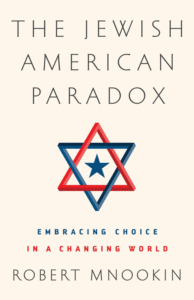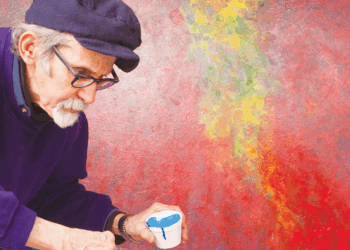Reviewed by NEAL GENDLER

Being Jewish should be a matter of choice, not descent, says Robert Mnookin, who says the greatest threat to Judaism in America is the growing thinness of Jewish engagement.
The implicit argument for choice is that by going beyond Reform’s conditional acceptance of patrilineal descent, our numbers might be bolstered sufficiently to make up for losses from intermarriage and indifference.
“The situation of American Jews today is deeply paradoxical,” says Harvard Law professor Mnookin, who directs Harvard’s Negotiation Research Project. “Some 94 percent of us express pride in being Jewish, as well we should. The evidence of Jewish success in America is stunning.”
Just two percent of the population, Jews “as a group … enjoy outsized influence and esteem,” he says in The Jewish American Paradox. Fifty-nine percent have college degrees, twice the nation’s 27 percent average. In graduate degrees it’s 28 versus 10. Forty four percent have household income over $100,000; the population average is 19 percent.
So if things are so good, why are they so bad?
He gives four reasons: Most American Jews don’t practice the religion; American Jews no longer are persecuted for being Jewish; Israeli policies often cause bitter conflicts, not unity; and by 2000, 58 percent of American Jews were marrying outside the faith.
“Among the non-Orthodox who have married since 2000, the intermarriage rate is 72 percent,” he says. “It’s not clear how long we can collectively sustain a strong sense of Jewish identity.”
The trends are depressingly familiar, the solutions more elusive, although a 16-page chapter suggests ways parents can strengthen identity.
With anti-Semitism pushed to America’s fringes, young Jews haven’t experienced persecution, “and our tragic history is not a good reason to choose to be Jewish today,” Mnookin says. “If Americans of Jewish heritage are going to identify as Jewish, it will need to be for positive reasons.”
His reasons for no longer requiring matrilineal descent or formal conversion are mixed into a lengthy history of his lack of observance, confronting him when daughter Jennifer asked: “When are we actually going to become Jewish?” She wanted a Bat Mitzva ceremony, like her friends. That led to Reform affiliation, but Mnookin maintains that he’s not religious.
“This book, grounded in my struggle to come to terms with my own Jewish identity, proposes a new way of thinking about who counts as Jewish,” he says. He put much effort into it: 61 pages of notes, many quite interesting.
His “Big Tent” approach would accept as part of the American Jewish community those who wish to identify, “no matter how many Jewish parents they have. It also allows people to leave the tribe without being condemned by other Jews.” This, he says, “meets critical contemporary needs and offers a sound basis for Jewish identity in America.”
Maybe.
“Judaism has always emphasized behavior over belief,” Mnookin says, but should it suffice simply to declare “I am a Jew,” with no admission standard? Circuses’ big-tent admission standard is money. Clubs usually require dues (we have that one covered) and regular attendance (most U.S. Jews flunk).
In The Boundaries of Judaism, Donniel Hartman says a collective identity “must entail some shared common notion of boundaries which serve to demarcate the space which all Jews agree to share.”
But Mnookin counters that “no single boundary is accepted by all American Jewish institutions.” Instead, he proposes a two-part standard.
The American Jewish community as a whole would be in the Big Tent. Inside, groups or institutions could set their own boundaries.
“I want a standard that is broadly inclusive, emphasizes individual choice, and does not require people to express their Jewishness in any particular way,” he says. “The Big Tent standard minimizes the importance of descent.”
Mnookin’s five categories of people allowed inside excludes only “those who don’t publicly identify with the tribe and don’t want to belong” he says.
“What I’m really arguing for is greater tolerance for ambiguity,” he says. “Let’s reach out to those who might be reachable. Welcome everyone who wants to come in.”
***
Neal Gendler is a Minneapolis writer and editor.



















